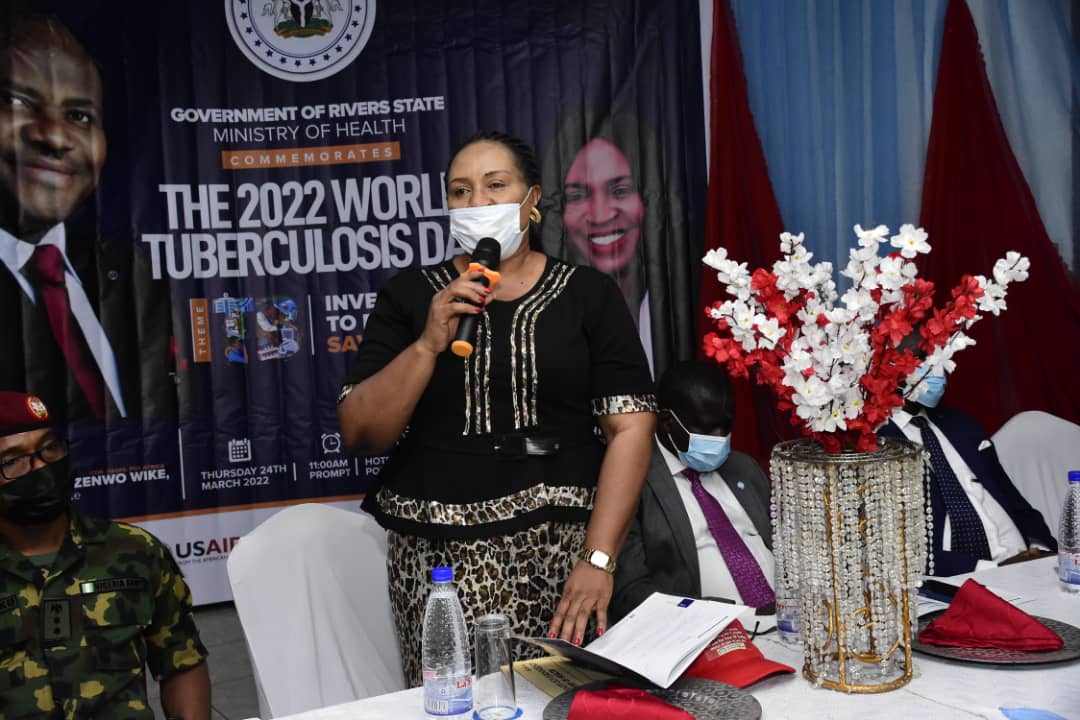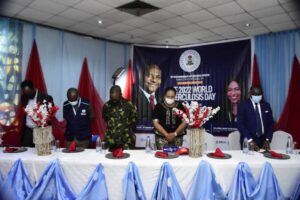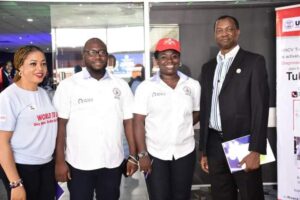News
Rivers Can Eliminate TB By 2030, If…

Rivers State is capable of eliminating tuberculosis before the end of 2030 with the right partnership and investment, according to the Permanent Secretary of the state Ministry of Health, Dr. Ndidi Chikanele Utchay.
Utchay, who disclosed this in her welcome address during an event marking the 2022 World Tuberculosis Day (WTD), in Port Harcourt, yesterday, said a lot was currently being done to ensure that the state was free of TB before the end of 2030.
“Fortunately, TB is curable and is among the diseases marked for eradication by the World Health Organisation (WHO). In Rivers State, the ‘End TB Strategy’ continues to guide our resolve to eliminate TB before the year 2030, with focus on the three pillars of Integrated Patient-Centred Care and Prevention, Bold Policies and Supportive Systems, and Intensified Research and Innovation”, she said.

She explained that the determination of the state to eliminate TB in the state informed the expansion of diagnostic service points from the rapid diagnostic machines (Gen-Expert) to 17 machines with a new “16-modules Gen-Expert diagnostic machine recently installed at the Rivers State University Teaching Hospital (RSUTH), 642 Directly Observed Treatment Shortcourse (DOTs) centres and 121 microscopic sites for monitoring of treatments”.
Utchay stated further that the support from partners in the state has introduced new diagnostic equipment such as TB Lamp, Trunat, and LF Lan to ensure that people have access to TB diagnostic and treatment services, “which has been, and will continue to be free-of-charge”.
Noting the 2022 theme, which is “Invest to End TB, Save Lives”, with the national slogan: “Give More, Do More, End TB”, she said it was inline with the state’s strategy to engage the corporate sector in partnership.
While thanking the state Governor, Chief Nyesom Wike, for what she called his immeasurable support to health issues, she noted that with the right investment and partnership, Rivers State can be free of TB before 2030.
In acknowledging the successes recorded by the state in pursuit of eliminating TB, the state Programme Manager, Tuberculosis, Leprosy and Burulli Ulcer, Dr. Victor Oris-Onyiri, stated that beyond the 8,000 persons that have been diagnosed of TB and placed on treatment, another 9,000 missing cases in the communities need to be found.
“We need to find those cases that are missing within the communities and place them on treatments”, he said.
The 8,000 cases that were found in 2021, he said, was an improvement from previous years, and indicative of a better 2022.

“Last year, we did over 8,000 cases. It means that the health care workers are motivated, it means that a structure for success is available, and we all must take advantage of it.
“We can beat this disease in Rivers State”, he said.
Oris-Onyiri stated further that although the WHO has set aside 2035 as a time for the eradication of TB in the world, Rivers State was capable of eradicating it by 2028.
In her goodwill message to commemorate the 2022 WTD, the Programme Director, Institute of Human Virology, Nigeria (IHVN), Rivers ART Surge Project, Olupitan Olayemi, said the institute joins the state in celebration efforts made so far in the right to eliminate TB.
“Each year, we commemorate World TB Day to raise public awareness about the devastating health, social, and economic consequences of TB and step up efforts to end the global TB epidemic. Globally, TB is the second leading infectious killer disease after COVID-19.
“As the lead Implementing Partner in the US CDC funded provision of HIV/AIDS Prevention, Care and Treatment in Rivers State, our core mandate in the Surge Project is to bridge the 79percent gap in identifying the people living with HIV, ensure their linkage to sustained treatment and achieve viral suppression as well support TBHIV services across all supported facilities in Rivers State.
“As the people of Rivers State celebrate the progress made thus far in the fight against TB, we wish you more years of leadership and innovation in the service to humanity”, she said.
The WTD is marked on the 24th of March annually across the world.
By: Sogbeba Dokubo
News
Shettima In Ethiopia For State Visit

Vice President Kashim Shettima has arrived in Addis Ababa, Ethiopia, for an official State visit at the invitation of the Prime Minister, Dr. Abiy Ahmed.
Upon arrival yesterday, Shettima was received at the airport by the Minister of Foreign Affairs of Ethiopia, Dr. Gedion Timothewos, and other members of the Ethiopian and Nigerian diplomatic corps.
Senior Special Assistant to the Vice President on Media and Communication, Stanley Nkwocha, revealed this in a statement he signed yesterday, titled: “VP Shettima arrives in Ethiopia for official state visit.”
During the visit, Vice President Shettima will participate in the official launch of Ethiopia’s Green Legacy Programme, a flagship environmental initiative.
The programme designed to combat deforestation, enhance biodiversity, and mitigate the adverse effects of climate change targets the planting of 20 billion tree seedlings over a four-year period.
In line with strengthening bilateral ties in agriculture and industrial development, the Vice President will also embark on a strategic tour of key industrial zones and integrated agricultural facilities across selected regions of Ethiopia.
News
RSG Tasks Farmers On N4bn Agric Loan ….As RAAMP Takes Sensitization Campaign To Four LGs In Rivers

The Rivers State Government has called on the people of the state especially farmers to access the ?4billion agricultural loans made available by the State and domiciled in the Bank of Industry.
This is as the State Project Implementation Unit (SPIU) of Rural Access and Agricultural Marketing Project (RAAMP), a World Bank project, took its sensitization campaign to Opobo/Nkoro, Andoni, Port Harcourt City and Obio/Akpor local government areas.
The campaign was aimed at enlightening community dwellers and other stakeholders in the various local government areas on the RAAMP project implementation and programme activities.
The Permanent Secretary, Rivers State Ministry of Agriculture, Mr Maurice Ogolo, said this at Opobo town, Ngo, Port Harcourt City and Rumuodumanya, headquarters of the four local government areas respectively, during the sensitization campaign.
Ogolo said apart from the ?4billion, the government has also made available fertilizers and other farm inputs to farmers in the various local government areas.
The Permanent Secretary who is the Chairman, State Steering Committee for the project, said RAAMP will construct roads that will connect farms to markets to enable farmers and fishermen sell their farms produce and fishes.
He also said rural roads would be constructed to farms and fishing settlements, and warned against any act that will lead to the cancellation of the projects in the four local government areas.
According to him, the World Bank and Federal Government which are the financiers of the programme will not condone such acts like kidnapping, marching ground and other acts inimical to the successful implementation of the projects in their respective areas.
At PHALGA, Ogolo asserted that the city will benefit in the areas of roads and bridge construction.
He noted that RAAMP was thriving in both the Federal Capital Territory, Abuja; Lagos and other states in the country, stressing that the project should also be given the seriousness it deserves in Rivers State.
Speaking at Opobo town, the headquarters of Opobo/Nkoro Local Government Area, the project coordinator, RAAMP, Mr.Joshua Kpakol, said the programme would reduce poverty in the state.
According to him, both fishermen and farmers will maximally benefit from the programme.
At Ngo which is the headquarters of Andoni Local Government Area, Kpakol said roads will be constructed to all remote fishing settlements.
He said Rivers State is lucky to be among the states implementing the project, and stressed the need for the people to embrace it.
Meanwhile, Kpakol said at PHALGA that RAAMP is a project that will transform the lives of farmers, traders and other stakeholders in the area.
He urged the stakeholders to spread the information to their various communities.
However, some of the stakeholders at Opobo town complained about the destruction of their farms by bulls allegedly owed by traditional rulers in the area, as well as incessant stealing of their canoes at waterfronts.
At Ngo, Archbishop Elkanah Hanson, founder of El-Shaddai Church, commended the World Bank and the Federal Government for bringing the projects to Andoni.
He stressed the need for the construction of roads to fishing settlements in the area.
Also, a former Commissioner for Agriculture in the state and Okan Ama of Ekede, HRH King Gad Harry, noted that storage facilities have become necessary for a successful agricultural programme.
Harry also stressed the need for the programme to be made sustainable.
In their separate speeches, the administrators of Andoni and Opobo/Nkoro Local Government Areas, pledged their readiness to support the programme.
At Port Harcourt City, the Administrator, Dr Arthur Kalagbor, represented by the Head of Local Government Administration, Port Harcourt City, Mr Clifford Paul, said the city would support the implementation of the programme in the area.
Also, the administrator of Obio/Akpor Local Government Area, Dr Clifford Ndu Walter, represented by Mr Michael Elenwo, pledged to support the programme in his local government area.
Among dignitaries at the Obio/Akpor stakeholders engagement is the chairman, Rivers State Traditional Rulers Council and paramount ruler of Apara Kingdom, HRM Eze Chike Wodo, amongst others.
John Bibor
News
Tinubu Orders Civil Service Personnel Audit, Skill Gap Analysis

President Bola Tinubu has ordered the commencement of personnel audit and skill gap analysis across all cadres of federal civil servants.
The president gave this directive in Abuja, yesterday, while speaking at the International Civil Service Conference, reaffirming his resolve to achieve efficiency and professional service delivery in the civil service.
“I have authorized the comprehensive personnel audit and skill gap analysis across the federal civil service to deepen capacity. I urge all responsible stakeholders to prioritize timely completion of this critical exercise, to begin implementing targeted reforms, to realize the full benefit of a more agile, competent and responsive civil service,” the president announced.
Tinubu further directed all Ministries, Departments and Agencies (MDAs), to prioritise data integrity and sovereignty in national interest.
He called for the capture, protection and strategic publication of public sector data in line with the Nigeria Data Protection Act of 2023.
“We must let our data speak for us. We must publish verified data assets within Nigeria and share them internationally recognized as fruitful. This will allow global benchmarking organisation to track our progress in real time and help us strengthen our position on the world stage. This will preserve privacy and uphold data sovereignty,” Tinubu added.
President Tinubu hailed the federal civil service as the “engine” driving his Renewed Hope Agenda, and the vehicle for delivering sustainable national development.
He submitted that the roles of civil servants remain indispensable in modern governance, declaring that in the face of a fast-evolving digital and economic landscape, the civil service must remain agile, future-ready, and results-driven.
“This maiden conference is a bold step toward redefining governance in an era of rapid transformation. An innovative Civil Service ensures we meet today’s needs and overcome tomorrow’s challenges.
“It captures our collective ambition to reimagine and reposition the civil service. In today’s rapid, evolving world of technology, innovation remains critical in ensuring that the civil service is dynamic, digital” the President said.
Head of the Civil Service of the Federation, Didi Walson-Jack in her welcome address told the President that his presence and strong words of commendation at the conference has renewed the morale and mandate of public servants across the country.
Walson-Jack described Tinubu as the backbone of driving transformation in the Nigerian civil service, and noted that the takeaways from past study tours undertaken to understudy the civil service in Singapore, the UK and US under her leadership, is already yielding multiplier effects.
Walson-Jack assured Tinubu that her office, in collaboration with reform-minded stakeholders, will not relent in accelerating the implementation of the Federal Civil Service Strategy and Implementation Plan, FCSSIP 25.
She affirmed that digitalisation, performance management, and continuous learning remain key pillars in strengthening accountability, transparency, and service delivery across MDAs.
Walson-Jack reaffirmed that the civil service is determined to exceed expectations by embedding a culture of innovation, ethical leadership, and citizen-centred governance in the heart of public administration.

